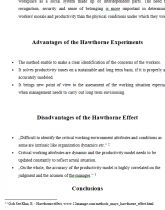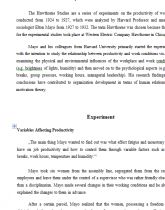Semestrálna práca: Hawthorne and the Western Electric Company
Skryť detaily | Obľúbený- Kvalita:82,4 %
- Typ:Semestrálna práca
- Univerzita:Univerzita Komenského v Bratislave
- Fakulta:Fakulta managementu
- Kategória:Ekonomika
- Podkategória:Management
- Predmet:Manažment
- Rozsah A4:6 strán
- Zobrazené:1 045 x
- Stiahnuté:0 x
- Veľkosť:0,1 MB
- Formát a prípona:MS Office Word (.doc)
- Jazyk:anglický
- ID projektu:12139
- Posledna úprava:24.09.2019
History of Hawthorne studies
The Hawthorne Studies are a series of experiments on the productivity of workers conducted from 1924 to 1927, which were analyzed by Harvard Professor and american sociologist Elton Mayo from 1927 to 1932. The term Hawthorne was chosen because the site for the experimental studies took place at Western Electric Company Hawthorne in Chicago.
Mayo and his colleagues from Harvard University primarily started the experiments with the intention to study the relationship between productivity and work conditions vis-à-vis examining the physical and environmental influences of the workplace and work conditions (e.g. brightness of lights, humidity) and then moved on to the psychological aspects (e.g. rest breaks, group pressure, working hours, managerial leadership). His research findings and conclusions have contributed to organization development in terms of human relations and motivation theory.
The Hawthorne Studies are a series of experiments on the productivity of workers conducted from 1924 to 1927, which were analyzed by Harvard Professor and american sociologist Elton Mayo from 1927 to 1932. The term Hawthorne was chosen because the site for the experimental studies took place at Western Electric Company Hawthorne in Chicago.
Mayo and his colleagues from Harvard University primarily started the experiments with the intention to study the relationship between productivity and work conditions vis-à-vis examining the physical and environmental influences of the workplace and work conditions (e.g. brightness of lights, humidity) and then moved on to the psychological aspects (e.g. rest breaks, group pressure, working hours, managerial leadership). His research findings and conclusions have contributed to organization development in terms of human relations and motivation theory.


